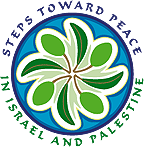St. George Melkite Church, Zababdeh, West Bank-Nov. 8
On Sunday nov 8th , we were all dressed nicely to participate in the liturgy of the mass with Abuna (Father) Firas in Zababdeh, a predominantly Christian village in the west bank. Abuna Firas, a Melkite priest which is a rite of catholicism still aligned with the vatican. Fr. Frias is a remarkable person, humble but with gray, steely eyes that befit his strong, unwavering character. St. George is a modest church, the pews on either side do not match, but can probably accomodate 125 parishioners, However, he explained to us that amount of space was not necessary at first since the church has been closed since 1982 with the death of the priest and at that time no other priest was sent by the bishop. After much delay and assistance from Abuna Chacour, Firas was ordained and then appointed as priest to St George’s church by request . By this time it was 2002 and from all the years of neglect and abuse, the church was in terrible condition, with windows broken, no front entrance door and several other damages. When he first went to the church, Firas found it inhabited by hundreds of rats eating at the walls and a snake that stared him in the face. The bishop told him there were no funds for repairs therefore, Firas and his wife, Doris along with a few local laborers did the repairs themselves. The first mass Abuna celebrated only 5 people were in attendance and one of them was he, that was in 2002. Over the years the congregation has increased to 50 families, however, many are unable to attend Sunday mass regularly since Sunday is a regular working day in the West Bank.
St. George’s church is so modest that Abuna Firas has no sacristry to dress in, therefore, he donned his vestments right at the altar and then proceeded to start the mass by incensing the altar. The service was spoken mainly in arabic, the vernacular of the area. His singing voice was quite strong and hypnotic and many of our group felt that the service was the most visceral they had ever experienced, His sermon was done in both arabic and english. He thanked our group for coming to witness the lives of the palestian christians and exhorted us to spread their message of peace, love and reconciliation. He graciously invited all to partake in communion-local bread and dipped in wine placed on our tongues.
After mass, coffee was served in the church courtyard with bread and cookies. He explained in his Christian rite that a child gets baptized, first communion and confirmation all at once and by the priest only; the bishop does not participate. He this was done since the population of the Palestinian Christians has decreased to 2% of Palestinian Arabs, although this area has had the earliest christians, dating back 2000 years ago when the original disciples of Jesus preached his word of love. He further stated that this was so because the Palestinian Christians feel that their plight is the hardest to contend with, being stuck between the Israeli Jews and Arab Muslims, and that they were the forgotten faith as far as attention and aid from internationals is concerned. Therefore, many Palestinian Christians leave if the opportunity arises to provide a better future for their families.
Firas stated that he has become “God’s businessman”-helping his flock to sell their homemade products such as olive oil soap and olive wood creches and assisting with adopting of local christian children by internationals for $500 /yr so that the christian children can go to the christian school and have a chance at a better tomorrow and profession, so that they will stay in palestine.

Abuna Firas, himself, is married with four children, In order to protect them and the rest of his flock he has shown himself to be a man of strength, acting like a human shield at check points so that others can pass by the soldiers and get to their olive groves, jobs, etc. He also reported that when the Jenin refuge camp was attacked in 2002 that his village was also under siege and that soldiers actually came to his home leveling their automatic rifles at his door, demanding that he come out, he refused saying no weapons could be carried into the church. He then was able to contact the Israeli Defense Force commander who called off his soldiers.
All in all, it was a very enlightening visit with this holy man,” God’s businessman”, a true "living stone”. While thousands of Christians visit traditional holy sites, very few bother to meet and worship with their brothers and sisters in Christ who live in the Holy Land. Christians in the West Bank desperately need to know they have not been forgotten by Christians in the west. They need not only our affirmation, but our help.








